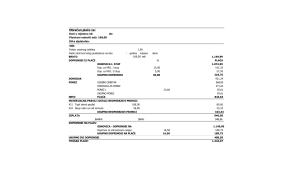Resume writing is a skill we all have underdeveloped. Unfortunately, people often write things in it that should not belong in it, which harms their impression in the selection process. Below we present seven things that are often written in resumes, but which should not be written.
If you have a well-written resume ready, look for a new job with it!
Writing a resume: you don’t need to write reasons for the end of employment
One of the things that people often think employers are interested in is the reason for termination. It is a fair assumption that people in the selection process will be interested in why someone stopped working for a particular employer, but such questions are usually asked in a job interview. If such things are written in the resume with every work experience, it will seem strange and loose, and people reading the resume will think that the candidate is a deeply dissatisfied person who potentially has problematic interpersonal relationships.
It is better to prepare for such questions at the interview than to try to anticipate the questions and write a short description of each work experience in the resume. This rule applies whether a person has a lot or a little work experience. When preparing to answer such questions during the conversation, you should think about the reasons in advance and prepare an answer to such questions, especially if the situation seems unclear and requires an explanation.
Marital status does not belong in resume writing
It’s actually surprising how many applicants think this information will help them, so they state that they are married or how many children they have. They probably think that the image of them as a family person will help them prove that they are a well-rounded person. Sometimes people not only state that they are married, but also that they have been married for a long time and are faithful to their spouse. This is unnecessary.
Some people’s resume writing often includes not only information about their marital status but also information about years of marriage, dates of marriage or divorce, number of children, and dates of their birthdays. This information does not belong in resumes at all. It only includes information about the candidate’s work and educational experiences, not their family history.
Life history also does not belong in writing a resume
One of the things that ordinary people often do when writing a resume is to include entire life stories about themselves. Many believe that such stories will win over an employer. Many are proud or want others to think of them as people who have overcome difficult life circumstances or who have many successes in life. Unfortunately, most employers do not give feedback on the selection process to candidates, so such people continue to repeatedly send resumes with their life stories, not knowing that they have not spiced up their resume, but spoiled it.
When writing a CV, you should always keep in mind that it should only contain a work biography. Sometimes details from life can be useful in a resume. For example, if someone wants to get a job in a sports store or a sports magazine, it is useful to mention the history of successful sports competitions from an early age. However, very often personal stories in resumes are not at all related to work and educational experience. People tell stories about the neighborhoods they grew up in, what their parents were like, or the trips they took. This will only irritate the potential employer and give him the impression that the candidate does not know the difference between business qualifications and private life.
An exaggerated description of your personality does not belong in a resume
Almost every job advertisement lists personality traits such as proactivity, independence, and responsibility among the soft skills. Often the same four to five skills appear in almost all job advertisements and are almost taken for granted by every worker. No one wants an irresponsible or passive person as a worker.
But because of this trend, people misunderstand what the employer is interested in, so they start listing too many characteristics of their personality in their resumes. People sometimes mention completely unimportant traits like sarcasm, and sometimes they point out that they are honest people, which should be a given, and highlighting such a trait can achieve the opposite effect. Only characteristics that will meaningfully express the difference from other possible candidates should be written in the CV. On the other hand, it should be kept in mind that sometimes employers want candidates to write in their resumes that they are conscientious and responsible people, but it is better that such qualities are evident from work achievements, and not because the person wrote it at the beginning of the resume.
Dilemma: to write or not to write hobbies
One of the things that often worries people when writing a resume is whether should they list their hobbies. Some people do not have special hobbies, so they are afraid that they will turn out to be boring and personally unmotivated people. Others are too proud of how active they are, so they list they dance, ride horses, and participate in pub quizzes.
The best recommendation when writing a resume is to briefly list a few hobbies at the end of the resume, especially if they are active and usually very useful for any occupation. One of the good examples of this is learning new languages. Depending on the job, volunteering may be a good thing to mention if the job requires organizational skills or in specific cases such as photography and journalistic work. However, you should definitely remember that unimportant hobbies should not be mentioned in any way. Nobody cares if you play computer games in your free time. Even in jobs where it would be an advantage such as a programmer in the video game industry, such an interest is implied and expected from the candidate.
Writing unnecessary work experiences in resumes
We already mentioned this in the previous resume writing guide, but it bears mentioning again. You don’t need to write every work experience in your resume. Employers are most interested in the candidate’s most recent experience and that they do not have too many job gaps in their work history. However, gaps in experience are usually asked about during a job interview or over the phone.
Probably the most common mistake is that people write every work experience in their work experience, even when it is important for their career. This is very common among young people who at the beginning of their career have nothing to write in their CV, but more experienced people do it too. Even worse, with each work experience, they list details, so their resume has four to five pages. This is a mistake. The curriculum vitae should be concise and reviewed and fit into two pages at most. If someone has already changed a lot of jobs, it is better to prepare a selected work experience, and not to mention every job. Nobody cares if someone worked for pocket money in a photocopier.
Writing life habits in the CV
One of the things that some candidates highlight in their biography is their lifestyle. Thus, they state that they do not drink, do not smoke, or are vegetarians. They probably want to improve their impression by emphasizing that they live a healthy life, but this can give the wrong impression. Employers want workers with whom others can have a drink or a conversation, and they may mistakenly conclude that the candidate thinks he is superior to people who have some vices.
There is no need to mention vices, more precisely their absence. Some people even report moderate drinking which can give the impression that the person is covering up known facts about them, such as a potential addiction problem. Vices are a topic for acquaintances and friends, not in the selection process.
Conclusion
When writing a resume, you should be guided by only one key rule: what is relevant in your work experience, not what is relevant about yourself as a person. The CV must be short (one to two pages), easily read, and sharp. Otherwise, the candidate may be eliminated in the selection process because his resume may give the impression of him as a weirdo or a person who knows how to recognize professionally important information. It is better to have less and more important information than a lot of unimportant information.
Now that you know what doesn’t belong in your resume, write it again and use it to find a new job!
Autor: Goran Mihelčić





